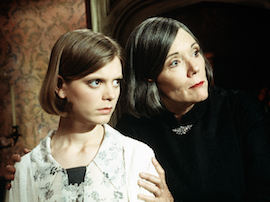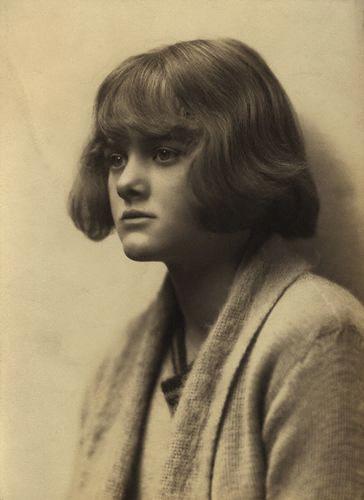This adaptation was first broadcast on ITV in the UK and PBS in the US; it's around 180 minutes long and is split into two episodes. Emilia Fox stars as Mrs. de Winter in her very first leading role. Opposite her are Charles Dance as Maxim de Winter and Dame Diana Rigg as Mrs. Danvers; two actors who would later also star opposite each other in HBO's Game of Thrones.
 |
| That's it. That's the show. |
Unlike the previous film, Daphne du Maurier never saw this adaptation; she passed away in 1989 at the ripe old age of 81 - in fact this adaptation was broadcast 90 years after her birth! I think she would have been pleased with this adaptation, though; luckily for us, Rebecca is one of those rare novels which doesn't have a lack of decent adaptations for us to seek out, whether you're interested in a radio production, a film, a television series, a play or even an opera!
What I loved most about this adaptation is little Emilia Fox, whose portrayal of Mrs. de Winter is practically perfect. The cast as a whole is wonderful in this adaptation - it's not a bad adaptation at all - and I think both Charles Dance and Diana Rigg are wonderful. For me, though, I prefer Laurence Olivier and Judith Anderson's portrayals of these characters; I think Charles Dance is a brilliant Maxim, I particularly like how much older than Emilia Clarke he looks because there is definitely a peculiar paternal relationship between Maxim and his second wife as much as a romantic one, but in my head Laurence Olivier looks a lot more like Maxim than Charles Dance does.
Similarly, as much as I love Diana Rigg, and as much as I think her portrayal of Mrs. Danvers is fantastic, there's just no competition with Judith Anderson. Anderson's Mrs. Danvers is perfection and her shoes are awfully big ones to fill, though they do both bring something different to the role; Diana Rigg's portrayal is more vulnerable than Judith Anderson's - not softer, because nothing about Mrs. Danvers is soft - but she feels more human and more beatable. Perhaps that's why, if I had to pick, I'd rather watch Hitchcock's adaptation; villains are a lot more fun when they seem invincible.
Unlike the 1940 adaptation, however, I do think this adaptation's version of Mrs. de Winter is much more similar to the book, in fact the adaptation as a whole is a perfect adaptation whereas the 1940 adaptation makes tiny tweaks here and there. To say Emilia Fox is a 'better' Mrs. de Winter than Joan Fontaine is some praise to give to a woman in her very first leading role, but Emilia Fox's Mrs. de Winter has none of the glamour that an actress like Joan Fontaine can't not have. I think being very new to acting onscreen - before this her first screen appearance was in the 1995 adaptation of Pride and Prejudice - aided her in portraying that child-like, innocent and nervous way Mrs. de Winter carries herself throughout the majority of Rebecca; she even looks like a child dressing up as an adult.
 |
| Emilia Fox as Mrs. de Winter and Dame Diana Rigg as Mrs. Danvers. |
In fact I can't help wondering if they based Mrs. de Winter's appearance off Daphne du Maurier's own appearance in her younger years.
 |
| Daphne du Maurier in her youth. |
It wouldn't surprise me if they had based Mrs. de Winter on du Maurier herself; it's believed that Manderley is based on Menabilly, the house du Maurier restored and lived in for a while, and her husband Frederick Browning was nine years her senior.
 |
| Daphne du Maurier with her husband, Frederick Browning, and their three children. |
So if you're after a decent adaptation of Rebecca, both the 1940 adaptation and the 1997 adaptation are worth checking out. I won't say one is better than the other because I think whichever adaptation you prefer is all down to personal taste, but in my opinion neither of them are poor adaptations. If you're in the mood for a direct adaptation, for a period drama, then I recommend the 1997 adaptation, but if you want to watch something that totally captures the atmosphere of the novel I recommend Hitchcock's adaptation - it's a brilliant film to watch as Halloween approaches!


No comments:
Post a Comment